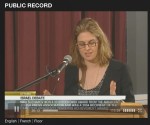With September upon us and the Gaza war behind us, university students may be facing Israel-on-campus discourse this semester with some extra trepidation. I often hear Jewish parents wondering about how we can best prepare our kids to “face” Israel opponents on campus. As a past active Jewish undergraduate student myself and now as a professor who specializes in the topic of Israel/Palestine, here are some of my thoughts about the best way to approach the topic of Israel on campus.
Critical thinking above all else. In today’s political climate, no one is served by advancing talking points rather than asking tough questions and truly listening. Jewish students should not have to see themselves as ambassadors of the Jewish state. Israel has its own cadre of hasbarah professionals. As a place to create intelligent and productive global citizens, the role of university is to help students absorb information and apply conceptual reasoning in a critically engaged way. Jewish students should not have to leave their critical faculties at the door on the subject of Israel, nor should they have to consider the classroom environment – with its natural predilection for analyzing multiple sides of a problem – as hermetically sealed from the rest of the campus, where more informal discussion and occasional activism takes place.
Put aside the labels. Students would be forgiven for believing that they must adopt a label like “pro-Israel” or “pro-Palestine” either before arriving on campus or while there. But, as I consistently try to show my students, those terms mean little. To some, being pro-Israel means supporting the settler enterprise. To others, it means spurring Israel to make peace with the Palestinian Authority. Similarly, being pro-Palestine may mean supporting Hamas’ war effort, just as it might mean supporting Mahmoud Abbas’ attempt to reach a peace agreement with the Israeli government. By assuming a monolithic stance, students mentally close out possibilities. Students who care about the region must take time to consider what is best for the individuals and nations living there.
Focus on the “why” questions. While the out-of-classroom campus climate can unfortunately tend towards the “blame game,” where activists point fingers at one side or another, students would be best served by focusing on the “why” questions. Analyzing why each set of political actors takes the actions they do is ultimately the best thing students can do to deepen their understanding of the region and perhaps to ultimately be in a position to help bring about desired outcomes. Importantly, addressing the “why” questions is not the same as providing moral justifications. “Why does Hamas shoot rockets?” could be addressed by an array of possible answers, all of which should be put on the table and evaluated using the best knowledge we have, before making gut assumptions. Focusing on these explanatory questions can also help to further dialogue with people whose instinctual political allegiances may be different.
Practice empathy. Moving from the “why” questions to the “what should be” questions is best done through a position of empathy. Understanding the narratives, experiences, and emotional and material reality of each “side” is essential to prescribing political outcomes that will stick. Just as demanding that Israel give up its Jewish identity is going to be a non-starter, so too is not recognizing that no people is going to accept living under occupation in perpetuity.
Start early. Finally, it’s all good and fine to hope that our community’s Jewish students are primed for Israel engagement on campus, but the kind of critical engagement that enables students to deploy all their intellectual and cultural tools must start early. Our community needs to ensure that spoken Hebrew instruction in our day and supplementary schools is a priority, thus paving the way for our students to engage with Israel and Israelis in a more intimate and nuanced way whether via social media or, ideally, in person. Similarly, our elementary and high schools should ensure that wide-ranging discussion on Israel and the Israeli-Palestinian relationship is encouraged, and that groupthink is avoided. An informed and critically engaged citizen will be one who can contribute most potently – and that is ultimately good for Jewish continuity, to boot.
Mira Sucharov is an associate professor of political science at Carleton University. She blogs at Haaretz and the Jewish Daily Forward. This article was originally published in the Ottawa Jewish Bulletin.

